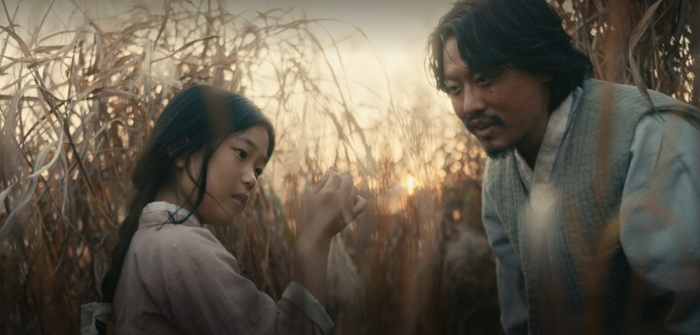By Kaleena Rivera | TV | April 9, 2022

There are many diasporas throughout the world, each of them unique, yet share a number of commonalities. These mass migrations are usually triggered through extended and brutal hardship, frequently due to war, colonization, or the horrific combination of the two. In Pachinko, the intergenerational epic drama based on Min Jin Lee’s bestselling novel of the same name, we see this specific identity portrayed by a Korean family over an 80 year period as they pursue survival and, over time, attempt to thrive as they remain unmoored from their homeland, creating fragile but persistent roots in unexpected places.
The story primarily revolves around the family matriarch, Sunja, who’s portrayed by three different actors over the course of her life: the child version played by Yu-na Jeon, older teen/young adult played by Minha Kim, and Elderly Sunja, played by Academy Award winner (for the beautiful and quietly devastating Minari) Yuh-Jung Youn. We watch Sunja as a young girl spending her days with her doting father, Hoonie (Dae Ho Lee), at the market and fearlessly diving for abalone. But their relative peace is constantly disrupted by Japanese authorities in the wake of Japan’s annexation of Korea in 1910. Although the series doesn’t spend too much time laying out the specific geopolitical aspects of this portion of history, we feel it all in the way Sunja and her family are forced to move through the world, whether it be a young Sunja being instructed on refraining from making eye contact with Japanese police or her adult grandson Solomon (Jin Ha) navigating bias in the workplace more than 40 years after the end of the Japanese occupation in 1945. While the lengthy time span allows for a number of ancillary characters consisting of lovers, in-laws, corporate lackeys, and everything in between, the emotional heartbeat alternates (and overlaps at times) primarily between Sunja and Solomon.
This family saga is shown via frequent time jumps throughout the season, alternating mostly between young Sunja and her journey from her home in Busan to a new life in Osaka—a series of falling dominoes set off by her improbable meeting with powerful businessman Koh Hansu (Lee Min-Ho), who lurks in the shadows throughout her life — and the ambitious Solomon, who tries desperately to make his mark in a cutthroat industry while trying to reconcile his fractured identity. His story has many moments that ring with familiarity for viewers who belong to any diasporic population. Speaking the language of your elders (which may itself be the product of colonialism) with a remarked upon accent, and only setting foot on that native homeland once or twice in life, if ever, are all part and parcel of being the first or second generation of people compelled to migrate to unfamiliar lands. For the American-educated Solomon, his Korean identity is regularly tied to his professional capabilities, especially as he travels to Tokyo to try his hand at a career-making deal. When Solomon isn’t coping with the lingering tension of being one of the few Koreans in a predominately Japanese space, or grappling with his superior, Tom (an oily Jimmi Simpson) — an American whose unasked for insight into the complicated Korean/Japanese dynamic is a dismissive, “Why can’t people just get over that, you know? It’s the past. It’s done” — he’s dealing with the wholly unexpected return of a childhood sweetheart, Hana (Mari Yamamoto), whose disappearance and present-day circumstances remain a mystery for much of the series.
Book fans (myself among them) will quickly discover that this adaptation deviates quite a bit from the source material. The most obvious change is in regards to the story’s structure, leaping back and forth from the early 20th century to the late eighties rather than the novel’s original linear fashion, a major shift addressed by many critics of the show. Admittedly, I found the storytelling style to be jarring at first, as it doesn’t easily lend itself to becoming invested in a given character and scenario before being wrenched away to look in on another. I adapted quickly, however, especially once the series developed a more organic flow, drifting in and out of these separate but loosely connected stories like a gifted storyteller who is inclined towards regular tangents. Even though Solomon has the most contemporary viewpoint, Sunja’s is the more compelling of the two, though there are numerous plot lines in the book that are never pursued (more seasons are planned in order to capture the full scope of the novel, though as of this writing, no formal news has been announced). Even supplemental material, such as an extended background on Hansu, coupled with a depiction of a major historical event, doesn’t quite slake the desire to delve back into the central family drama. The late-season drive to aim a larger lens at Korean history is understandable—creator Soo Hugh is herself the daughter of Korean immigrants—and when combined with a narrowed focus on the events of the novel itself, the end result is a series whose greatest flaw may be that it will leave the audience wanting more.
The first five episodes of Pachinko are available to stream on Apple TV+.
Kaleena Rivera is the TV Editor for Pajiba. When she isn’t constantly humming “Let’s Live for Today” (thanks to the lovely title sequence), she can be found on Twitter here.